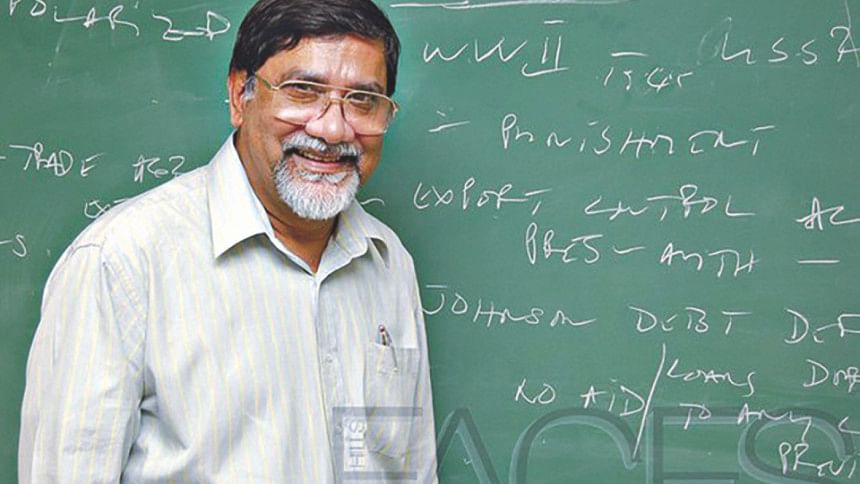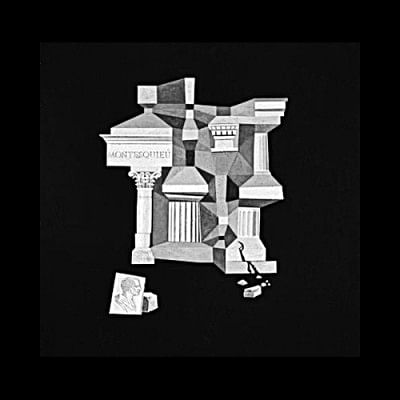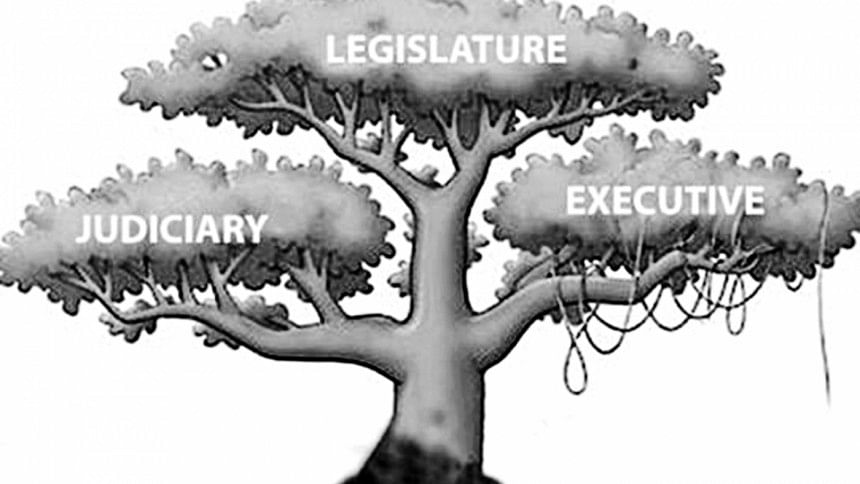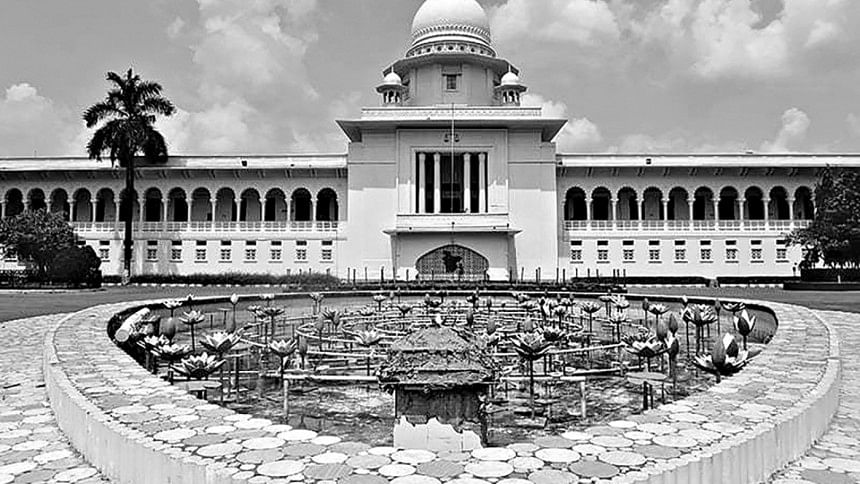Human rights and civil liberties must take precedence above all else

Professor Ahrar Ahmad, former freedom fighter and member of the Crack Platoon, has taught political science at the University of Dhaka, and in US universities, retiring as Professor Emeritus, Black Hills State University, South Dakota. He is currently the Director General of Gyantapas Abdur Razzaq Foundation in Dhaka. In an interview with The Daily Star, Professor Ahmad speaks to Eresh Omar Jamal about the model of separation of powers for the governance of a state and why it is so important.
Can you describe how the idea of separation of powers evolved in the history of political thought?
Aristotle had never invoked this phrase, but his argument about the efficacy of a Mixed Regime captures some of the concerns and issues that the notion seeks to address. He had suggested that the government of “the one” (i.e., monarch) may degenerate into a tyranny, of “the few” (i.e., aristocrats) to a self-serving and corrupt oligarchy, and of “the many” (i.e., commoners) into mob-rule. Hence, he had proposed a government that combined elements of all social classes so that they could balance each other and the three regime types could avoid becoming their worst.
Cicero and Polybius had echoed similar sentiments, as did Enlightenment theorists like Hugo Grotius and John Locke. However, since governments were becoming more complex and organisationally varied, the focus of later thinkers shifted from maintaining social-class equilibrium in the exercise of political power to thinking about securing a balance in the various institutions of government that were emerging. The common fear which they all shared was that the concentration of power in any form would be a threat to the efficiency and obligations of the government and the rights and well-being of the governed.
The political thinker who brought clarity and specificity to the notion of separation of powers was the French nobleman Charles-Louis Montesquieu. His book, The Spirit of the Laws (1748), emphasised the need for ensuring that the broad functions of government—legislative, executive and judicial—remain in specialised, distinct and autonomous institutions, and that they must have robust provisions through which they could check and balance each other to provide discipline, accountability and transparency. While some conflict and tensions about boundaries and jurisdictions may result, it would be far better than the alternative, which would endanger people's rights, jeopardise constitutional rule, and facilitate tyranny.
But it was the American Revolution, and the constitution of 1787, which saw these ideas being embraced, and its mechanics and logistics fleshed out, in full and concrete terms. James Madison, John Adams and Thomas Jefferson in particular had argued that, as a precondition for promoting the principle of “popular sovereignty”, protecting the “inalienable rights” of the people, and instituting constitutional supremacy through founding a “government of laws rather than men”, the powers held by the three branches of government must be defined, circumscribed, and subject to the scrutiny and oversight of one another.

Why do modern day nation states focus so heavily on the separation of powers between the different branches of their governments?
One brief clarification is in order. Montesquieu had referred to a trias politica, a tripartite arrangement, regarding the three branches of government. Even though the idea of checks and balances may be pursued in other ways as well, his formulation has remained the most logical, obvious and popular.
It should also be pointed out that the formation of modern nation states (let us say, between the Treaty of Westphalia in 1648 and the Congress of Vienna in 1815), was almost coterminous with the forward, though staggered, march of democracy in Europe. Discussions about the separation of powers became integral to that historical process of limiting monarchical prerogatives, expanding parliamentary authority, and guaranteeing people's rights through independent judiciaries.
Decolonisation after WWII ushered in many new states aspiring to be democracies. Many of them lacked the traditions, experiences and structures that had facilitated the European evolution. Hence, procedures and instruments relating to the separation of powers, for which there were successful examples, and which could be formalised through constitutional provisions, became all the more relevant in providing the framework for the establishment of democracies in these countries.
What is the difference between the idea of separation of powers as enshrined in our constitution, compared to that of other countries?
This would require a rather longish response detailing the various forms and modalities followed in other countries. Suffice it to say that our framers, who had been passionate about democracy, had pursued the idea in an informed and enthusiastic manner.
It must be remembered that they were more familiar with, and encouraged by, the British example than the American. Thus, they adopted the parliamentary rather than the presidential system of government. In the parliamentary system the seeming fusion of the legislative and executive functions in the office of the Prime Minister makes the concept of separation of powers more challenging to practice and maintain, whereas in the Presidential system these markers are clearly stated, and their procedural interactions well defined (e.g., the President is Commander in Chief, but only Congress can declare wars, the President is required to submit a budget to Congress, but cannot spend any funds without Congressional appropriation, the President appoints officials to all important positions including Cabinet members, Agency Heads, and Ambassadors, but the Senate vets and votes on all of them, the President nominates and the Senate confirms all Federal judges, but the Courts can declare any act of Congress, any Presidential action or any State law to be unconstitutional, and so on).
Even though our framers had embraced the British model, they had dedicated specific segments of the constitutions to the three branches of government (Parts IV, V and VI to the Executive, Legislature and Judiciary respectively), had incorporated some built-in checks through which their powers could be countervailed, and detailed not only some “Fundamental Principles of State Policy” (articles 8-25) but also some “Fundamental Rights” (articles 26-47) which the State was committed to respect and uphold. On paper, our approach had been quite impressive.

How effectively have we been able to implement this idea into our governance and political structures?
Our history in this regard is rather awkward and not particularly reassuring. For example, the independence of the judiciary, indispensable to the notion of the separation of powers, has not been unequivocally resolved. Even the question about whether the Parliament, or the President, or the Court leadership will have administrative authority over judicial personnel (governing their appointment, postings, promotions, or disciplining) has been difficult.
It has been changed various times (1975, 1978). It faced a major court case (Secretary, Ministry of Finance v Masdar Hossain, 1999), where the Court's directive to separate the judiciary faced 26 government petitions for postponement, and was finally accepted in principle in 2007. It provoked a constitutional amendment in 2014, which was declared unconstitutional by the Supreme Court in 2016, which was followed by the resignation of the Chief Justice (in rather unusual circumstances). It generated a gazette notification in 2017 (Bangladesh Judicial Service Discipline Rules) but this was denounced by many eminent jurists. The whole issue remains cloudy and fraught.
How has that contributed to our current political scenario?
Apart from the questions regarding the independence of the judiciary, there have been other developments which have also complicated the idea of separation powers. For example, the gradual predominance of the Executive branch in rather obvious and irresistible ways, and the fact that the Prime Minister wields manifest control over her party, the parliament and the governmental apparatus, has created imbalances inconsistent with the principle. Moreover, the culture of sycophancy and our abject power-worshipping tendencies accentuate the problem.
On the other hand, the legislature had previously enfeebled itself through boycotts, anaemic attendance, insipid debates (even, at times, the use of un-parliamentary language), rigid party control (through Article 70), committee ineffectiveness, preponderance of the business class in its composition, and so on. Currently, the fact that the Parliament operates without any real opposition robs it of any salience or moral authority, and since it has the advantage, or the curse, of having a party with a super-majority in control, the constitution itself becomes subservient to its interest and whim.
Finally, the perception that a pall of corruptions, inefficiencies, delays, burdens and distractions which hangs over the judicial system (with more than 3.3 million cases in the docket, and the judiciary being drawn into adjudicate, at times, on issues that can be easily handled through administrative fiat), coupled with the popular uneasiness that legal mechanisms may be used for partisan objectives to protect the faithful and hobble the opposition, have all weakened the ability of the Courts to pursue its mandate of judicial review very vigorously.

What are some steps we can take to ensure power is divided in a balanced way between the different branches of our government? And why is that important given Bangladesh's current political circumstances?
There are no easy solutions. But first, the independence of the judiciary must be categorical, the rule of law must be unconditionally established, and human rights and civil liberties (particularly freedom of speech) must be given a “preferred position” (as in US constitutional law) over politically popular but vague concerns regarding national security issues or excessive anxieties about “hurting” individual, group or religious sentiments.
Second, systems of representation may be revisited. For example, having a bicameral legislature, or instituting a system of proportional representation, or establishing decentralised structures with duly elected and constitutionally empowered local bodies, may all be considered.
Third, the Parliament must not appear to be beholden to the Executive, or act as an enabling institution without its own agency and autonomy. It must reassert its position, reclaim its broad oversight functions, and regain its moral authority by being more lively, relevant and respected.
And finally, public awareness must be raised emphasising the fact that these are not arcane issues of political theory but pertinent to the “lived realities” of the people.
It is true that the challenges to democracy in Bangladesh are many and complex. For example, there is lack of democracy in the political parties which for the most part remain personality oriented, ideologically malleable, and structurally fragile.
- There are enormous social and economic inequalities which are palpably increasing.
- There is a culture of impunity where the ability to flout the law is considered to be a badge of honour and abiding by the law a sign of personal weakness and low social status.
- There is rampant corruption which has gone far beyond the petty briberies and transactions typical of a rentier state.
- There are electoral coalitions which are temporary, ego driven and cynically contrived, and elections which have not become free from persistent doubts and misgivings regarding their integrity and inclusiveness.
- There are insecurities among the political elite which lead them to think that every question is a criticism, every criticism is a challenge, and every challenge is an existential threat.
- There are social norms and practices through which women, minorities and the “others” remain subject to persisting structures of vulnerability, marginalisation and cruelty.
- There is a lingering feudal mind-set which continues to frustrate the imperatives of modernity, civic mindedness, and engaged citizenship.
The separation of powers will not, by itself, resolve all the “issues” of democracy in Bangladesh. But it will certainly be helpful in that direction. Unless the three branches of government are allowed the space to perform their functions with self-assurance, ability and mutuality, democracy itself will remain problematised, and the spirit of the Liberation War will, in the process, be compromised.





Comments